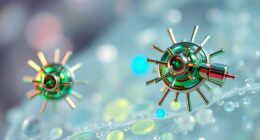Nanotech unicorns are emerging quickly by harnessing atomic-level engineering and nanoscale manufacturing. These startups precisely manipulate matter to create groundbreaking materials and devices that outperform traditional options. Their innovations are transforming industries like healthcare, electronics, and energy, leading to faster product development and new markets. As they continue pushing boundaries at the atomic scale, they’ll shape the future of technology. Keep exploring to discover how these companies are revolutionizing our world.
Key Takeaways
- Advances in molecular engineering enable startups to develop innovative, high-performance nanotech materials and devices.
- Nanoscale manufacturing allows precise, scalable production of specialized components, boosting product performance.
- Synergy between molecular design and nanoscale fabrication accelerates product development and market entry.
- Growing industries like healthcare and electronics are fueling investment and market interest in nanotech unicorns.
- Mastery of atomic-level manipulation positions startups for industry transformation and the creation of new markets.

Nanotechnology startups are transforming the innovation landscape, propelling several companies into the coveted status of unicorns—privately held startups valued at over $1 billion. At the core of this revolution lies molecular engineering, a sophisticated process that allows you to precisely manipulate matter at the atomic and molecular levels. By harnessing molecular engineering, these startups develop groundbreaking materials and devices with unprecedented control, leading to innovations that were once thought impossible. This mastery over matter at such a tiny scale opens up a sphere of possibilities, from targeted drug delivery systems to ultra-efficient energy storage.
Molecular engineering enables nanotech startups to create groundbreaking materials with atomic precision.
Nanoscale manufacturing is another vital pillar driving the rise of nanotech unicorns. It involves fabricating products at an extremely small scale, often at the level of nanometers. When you focus on nanoscale manufacturing, you access the ability to produce highly specialized components with exceptional precision. This process enables startups to create products with enhanced performance, durability, and functionality—traits that attract significant investment and market interest. For example, companies are now able to manufacture advanced sensors, lightweight yet super-strong materials, and next-generation electronics, all at the nanoscale.
What makes molecular engineering and nanoscale manufacturing so compelling is the synergy between them. As you delve into molecular engineering, you gain the tools to design materials atom-by-atom, ensuring each component performs exactly as intended. Then, through nanoscale manufacturing, you bring these designs into reality with meticulous precision, ensuring consistency and scalability. This combination allows startups to develop innovative solutions that outperform traditional alternatives, giving them a competitive edge and attracting venture capital. Additionally, ongoing research in AI Security and related fields is helping optimize these manufacturing processes for greater efficiency and safety.
Moreover, these technologies are not just confined to laboratories—they’re becoming integral to industries like healthcare, electronics, energy, and materials. As you watch these startups grow into unicorns, you’ll see how their mastery of molecular engineering and nanoscale manufacturing accelerates product development cycles, reduces costs, and opens new markets. Their ability to manipulate matter at such a fundamental level means they can solve complex problems faster and more efficiently than ever before.
In short, the rise of nanotech unicorns is driven by your ability to understand and leverage molecular engineering and nanoscale manufacturing. These technologies are transforming the way products are designed, produced, and utilized, positioning these startups at the forefront of innovation. As they continue to push the boundaries of what’s possible at the atomic level, you’ll witness a future where nanotech solutions become a vital part of everyday life, shaping industries and creating new opportunities along the way.
Frequently Asked Questions
What Are the Biggest Challenges Facing Nanotech Startups Today?
You face significant challenges in scaling manufacturing efficiently and maintaining control over intellectual property. Growing production without compromising quality can be tough, requiring substantial investment and expertise. Protecting your innovations from infringement is vital, yet complex, especially with evolving regulations. Balancing these aspects demands strategic planning, strong legal support, and innovative processes, so you can bring your nanotech solutions to market while safeguarding your competitive edge.
How Does Government Regulation Impact Nanotech Innovation?
Did you know that over 60% of nanotech startups cite regulatory hurdles as a major obstacle? Government regulation can substantially impact your innovation, often slowing down development with complex compliance requirements. However, policy incentives like grants and tax benefits can encourage growth. Managing these regulations is vital; they can either stifle your progress or open doors, depending on how well you adapt to the evolving legal landscape.
What Are the Environmental Risks of Nanotech Development?
You should be aware that nanotech development poses environmental risks like environmental toxicity, where nanoparticles can harm ecosystems and human health. Waste management becomes challenging as nano-sized materials are difficult to detect and contain, increasing pollution risks. Proper protocols are essential to minimize these dangers, ensuring safe disposal and reducing potential environmental harm. Staying informed about these risks helps you support responsible innovation in nanotech.
Which Industries Will Benefit Most From Nanotech Advancements?
Don’t you want to know which industries will see the biggest gains? You’ll find medical breakthroughs and energy solutions at the forefront, as nanotech enables targeted drug delivery, advanced diagnostics, and more efficient solar cells. Industries focused on healthcare and renewable energy will benefit most, transforming how we treat diseases and power our world. Embracing nanotech’s potential could revolutionize these sectors and improve everyday life considerably.
How Do Nanotech Unicorns Plan to Sustain Growth Long-Term?
You should focus on scaling strategies that allow nanotech unicorns to expand efficiently while maintaining innovation. Prioritizing talent acquisition helps attract top experts, fueling long-term growth. By continuously investing in research, developing strategic partnerships, and optimizing production processes, these companies can stay ahead of competitors. Embracing agility and adapting to market changes guarantee sustainable growth, enabling nanotech unicorns to lead their industries well into the future.
Conclusion
As you watch nanotech unicorns soar, it’s clear they’re on the cusp of transforming industries and pushing boundaries. Their rapid growth shows that the sky’s the limit when innovation and vision collide. Don’t blink or you might miss the next big breakthrough. Stay tuned, because in this game, it’s all about riding the wave before it crashes. The future’s bright, and with these trailblazers leading the way, you’re in for one exciting ride.









